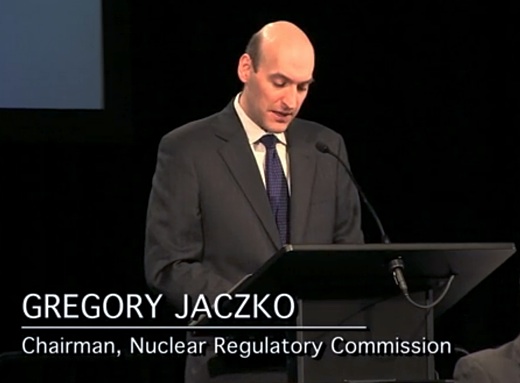 Image above: Still image of NRC Chairman Jaczko's presentation to Regulatory Information Conference. From video below.
While traveling in Japan several weeks ago, Fairewinds’ Arnie Gundersen took soil samples in Tokyo public parks, playgrounds, and rooftop gardens. All the samples would be considered nuclear waste if found here in the US. This level of contamination is currently being discovered throughout Japan. At the US Nuclear Regulatory Commission's Regulatory Information Conference in Washington, DC March 13 to March 15, the NRC's Chairman, Dr. Gregory Jaczko emphasized his concern that the NRC and the nuclear industry presently do not consider the costs of mass evacuations and radioactive contamination in their cost benefit analysis used to license nuclear power plants. Furthermore, Fairewinds believes that evacuation costs near a US nuclear plant could easily exceed one trillion dollars and contaminated land would be uninhabitable for generations.
Image above: Still image of NRC Chairman Jaczko's presentation to Regulatory Information Conference. From video below.
While traveling in Japan several weeks ago, Fairewinds’ Arnie Gundersen took soil samples in Tokyo public parks, playgrounds, and rooftop gardens. All the samples would be considered nuclear waste if found here in the US. This level of contamination is currently being discovered throughout Japan. At the US Nuclear Regulatory Commission's Regulatory Information Conference in Washington, DC March 13 to March 15, the NRC's Chairman, Dr. Gregory Jaczko emphasized his concern that the NRC and the nuclear industry presently do not consider the costs of mass evacuations and radioactive contamination in their cost benefit analysis used to license nuclear power plants. Furthermore, Fairewinds believes that evacuation costs near a US nuclear plant could easily exceed one trillion dollars and contaminated land would be uninhabitable for generations.
Video above: Arne Gundersen introduces and comments on NRC Chairman's reaction to Fukushima radiation .From (http://vimeo.com/38995781).
Transcript of Chairman Jaczko's words to Regulatory Information Conference.
NRC Chairman Jaczko: The events at Fukushima reinforce that any nuclear accident with public health and safety or environmental consequences of that magnitude, is inherently unacceptable. But we focussed on the radiological consequences of this event. I believe we cannot ignore the large social and economic consequences such an event poses to any country with a nuclear facility that deals with such a crisis.
In Japan, more than 90,000 people remain displaced from their homes and land, with some having no prospect for a return to their previous lifestyle in the foreseeable future. While not easy to characterize, these are significant hardships on these people and they are inherently unacceptable. So as we look to the future and we look in a proactive way, we ultimately will have to address the issue of how do we deal with nuclear events that lead to significant land contamination. And displacement, perhaps permanently, of people from their homes and their livelihoods and their communities.
Arnie Gundersen: What you have just heard was the Nuclear Regulatory Commission's chairman, Gregory Jaczko, saying that the NRC does not take in to account mass evacuations and people not getting back on their land for centuries when it does a cost benefit analysis as to whether or not a nuclear plant should be licensed.
I am Arnie Gundersen from Fairewinds and today I am at the Regulatory Information Conference put on by the NRC in Washington D.C.
So today, I am in Washington D.C. Couple of weeks ago though, I was in Tokyo and when I was in Tokyo, I took some samples. Now, I did not look for the highest radiation spot. I just went around with five plastic bags and when I found an area, I just scooped up some dirt and put it in a bag. One of those samples was from a crack in the sidewalk. Another one of those samples was from a children's playground that had been previously decontaminated. Another sample had come from some moss on the side of the road. Another sample came from the roof of an office building that I was at. And the last sample was right across the street from the main judicial center in downtown Tokyo. I brought those samples back, declared them through Customs, and sent them to the lab. And the lab determined that ALL of them would be qualified as radioactive waste here in the United States and would have to be shipped to Texas to be disposed of.
Now think about the ramifications for the nation's capital, whether it is Tokyo or the United States. How would you like it if you went to pick your flowers and were kneeling in radioactive waste? That is what is happening in Tokyo now. And I think that is the point that Chairman Jaczko was trying to make. When the Nuclear Regulatory Commission does it's cost benefit analyses now, it does not take into account the cost to society if you have to evacuate for generations or if you have to move 100,000 people, perhaps forever.
There is a hundred miles between us and a dozen nuclear power plants here in Washington D.C. Fukushima was almost 200 miles away from Tokyo, and yet Tokyo soil in some places, the ones I just happened to find, would qualify as radioactive waste here in the United States.
How would we feel if our nation's capital were contaminated to that degree? So I agree with Chairman Jaczko, new nukes and old nukes that are being re-licensed should include as a cost in their analysis what we have learned to be happening in Tokyo and in Japan.
Thank you very much and I will keep you informed.
See also: Ea O Ka Aina: NRC okays 1st nukeplant since 1978 2/9/12 Ea O Ka Aina: NRC Chair Jaczko target of commissioners 12/18/11 .
No comments :
Post a Comment